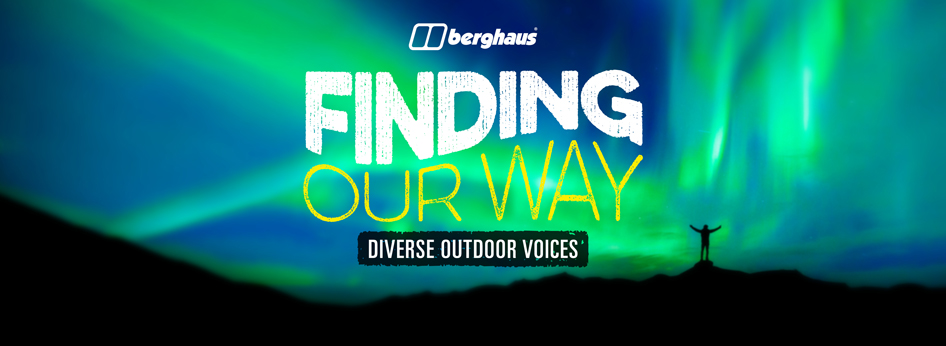In this episode, Richard Chapman talks about his young son dying from cancer, and the impact of that traumatic experience on his mental health. He also describes how climbing has helped him recover and manage PTSD.
Content Warning: Child Bereavement UK provides support for children, parents and families dealing with bereavement. They have a helpline 0800 02 888 40 or go to their website. If you need to talk to someone, you can call Samaritans any time day or night on 116 123.
The Finding Our Way Podcast champions diverse outdoor voices and is proudly sponsored by Berghaus.
.jpg)
Richard Chapman is a climber and mountaineer who is changing the way trauma is treated in mainstream healthcare. He has lived experience of trauma and PTSD, following the death of his first child. As time went by, Richard saw more stories in the news and on social media about the health benefits of being in the outdoors – which made him reflect on how the outdoors and climbing had helped him recover.
He’s passionate about helping other people access the benefits of climbing for their health and wellbeing and is now at the forefront of new NHS trials of ‘social prescribing’, where patients can be offered non-medical, community-based interventions – including climbing – as a pathway to recovery and hope.
A Quick Chat with Richard…
My son died of a very rare brain tumour in 1998 when he was 14 months old. Those emotional feelings are burned into the brain. If I let them resurface, it’s like touching a live wire or putting your hand in something that's too hot. The experience wasn’t just grief, it was trauma and the impact was profound - temper outbursts, poor sleep, invasive thoughts, visions of really unpleasant things. They all add up to something that is recognisable as post-traumatic stress disorder, PTSD. I got into climbing as a child, and it’s been part of my recovery.
What is it about climbing that makes it therapeutic?
If you allow traumatised people to experience emotion safely, and then give them the space to rationalise and reflect upon it, you re-establish the connections between the higher parts of the brain and emotional parts of the brain. You can rewire the brain, kickstart those neural networks and start to recover.
There’s been research into the power of yoga, singing in a choir, and doing theatre work. I don’t do yoga or sing in a choir, but I do climb. You’re doing physical exercise, which is good, and you’re outside in nature. But it feels much deeper and more fundamental than just getting a bit of a sweat on while looking at a nice view. I think it’s because there's a huge amount of emotion involved in climbing. You can't deny the effort, the concentration, the joy, the frustrations…but how does it benefit my brain?
This is work in progress, but I think I’ve identified seven principles that PTSD makes difficult but where climbing helps:
-
You have to prepare and plan – for what might be
-
Silence the inner judge and commit to the climb – even if you have doubt
-
Recognise your agency – and make decisions to keep yourself safe
-
Accept risk - and fear - and recognise what really is dangerous and what isn’t
-
There’s exposure – which demands you focus on what’s immediately in front of you in the moment
-
Being on your own or with a climbing partner in nature creates an intimacy and sense of inter-connection. You no longer feel alone.
-
Honest learning - sometimes you don’t get to the top, but that’s not necessarily failure. Because if you are good enough to go out there and try it and come back safely and go again another day, that's a success, right?
That makes a lot of sense! So how does this fit with the idea of ‘social prescribing’?
I’m helping the NHS and other care providers turn this into a ‘care pathway’ – where people can use climbing as part of their personalised care programme for PTSD or other mental health conditions. It’s not that you can take someone climbing and they'll suddenly be better, like flipping a switch. It's about the experience of connection and the emotional journey it helps you take over two, three, ten years. We need an evidence base to show it works – but that’s difficult because the NHS isn’t set up to measure treatment that will have positive outcomes in a decade’s time. It’s a challenge but there are partnerships that are already active and helping people. Like the GreenSpace green social prescribing partnership in Nottinghamshire. It’s one of seven ‘Test and Learn’ sites across England – people can talk to the link worker at their GP and be prescribed help to go climbing, paddleboarding and other activities in nature, with proper support.
Do you feel positive about the future?
My story is one of recovery. I don't know that I would have said that ten years ago. I realised that I was only ever really focussing on the first half of the story - what happened to me and the trauma that it caused and how I've struggled with that.
And actually, the more interesting part of the story is the second half - what happened subsequently and how my experience of climbing has led me to have four more children, that my wife and I are still married. I’ve led a very successful, fulfilling life and I feel better now than I have for a very long time. And I count that as a story of hope. Hope that things can get better. Hope that you're not just defined by what happened to you, but by what could happen next.
USEFUL LINKS FROM THE EPISODE
Child Bereavement UK provides support for children, parents and families dealing with bereavement
Children’s palliative care charity Together for Short Lives
Mountains for the Mind
Professor Miles Richardson’s work on nature connection
The Body Keeps the Score by Bessel Van Der Kolk
Susan David TED Talk: Emotional courage and the importance of negative emotions
Emotional Agility by Susan David
National academy for social prescribing
GreenSpace – green social prescribing partnership in Nottinghamshire
NHS Peer Leadership Development Course
Meet our guests from Season 1:
Rehna Yaseen: Free kit, ‘BAME’ and inspiring young South Asians
Euan Ryan: Making films, climbing and hidden disabilities
Bonita Norris: Everest, ethics and disordered eating
Rob Mitchell: Cake, maps, and gay, bi- & trans lads outdoors
Cherelle Harding: Urban community, reggae and rolling down hills
Stu Skinner: Deserts, jungles and mental health training
Finding Our Way is sponsored by Berghaus, and hosted by BMC walking ambassador Mary-Ann Ochota. Our editor is Chris Stone. Get involved with the conversation. Share your thoughts on @TeamBMC on Instagram and Twitter with the hashtag #FindingOurWay

Listen now 🎧
Finding Our Way is the new BMC podcast where our guests are as diverse as the outdoors should be.
Hosted by BMC Hillwalking Ambassador and TV Broadcaster Mary-Ann Ochota and Expedition Leader and equity champion Cress Allwood, the podcasts aims to diversify the people we normally hear talking about the outdoors, celebrate their stories and shine a light on their insights.
Listen and subscribe on your favourite podcast apps:





« Back